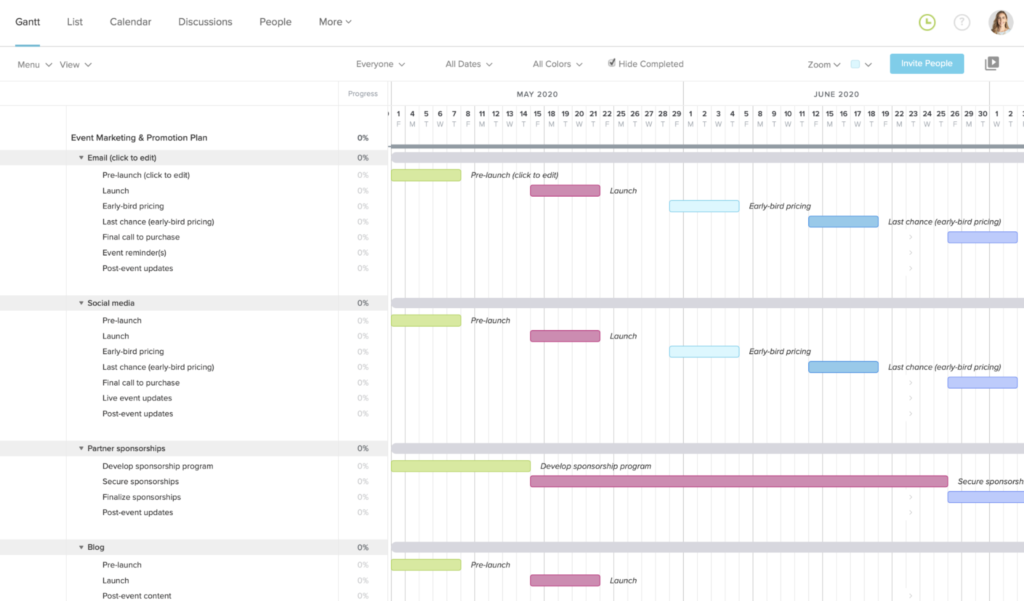Event marketing is about setting priorities and taking actions accordingly. In other words, event management companies should specify what are the most important aspects of event marketing strategies to consider first. That being said, we’ll explore in this article how to set up an event marketing timeline – that’ll raise the productivity and efficiency of your event marketing.
1. Why an event marketing timeline is important
Setting up a marketing timeline will enable your marketing and sales team to get a full overview of your marketing strategy. Furthermore, it will help you follow-up with your marketing strategies efforts and avoid any chaotic unplanned marketing actions. You can also assign your team members with tasks directly from the marketing timeline sheet instead of setting up a list of tasks for each team member.
One important note that you should consider is that there is a difference between the marketing strategy and timeline. Marketing strategy and marketing plans involve market research, marketing channels events, etc. Meanwhile, an event marketing timeline is the sheet that’ll define when each component of your marketing strategy will be executed.

Event marketing timeline sample. Source: Teamgant
2. Prioritize
Before speaking about event marketing timelines, event management companies should know that prioritizing important key elements of marketing strategy is vital. For instance, if you’re planning to market your event on a social media channel, then what channel is best? And how much time will it take to promote it successfully? Is there any urgency or deadlines to consider?
Setting up a priorities sheet will help you save time and effort, and will make your timeline more logical.
3. Choose your tools
What tools will you be using in your marketing timeline? If you’re planning to use a 3rd party software to set up an event marketing timeline, then choosing interactive, user-friendly software is mandatory.
For instance, Asana software is one tool that can help you set up a timeline with one click. If you’re a fan of Excel, then you can set up an Excel sheet for your timeline. However, it’s better to use 3rd party software since they provide more interactivity and can save you a lot of time.
4. Short-term timeline
There are two ways you can set up a marketing timeline. On one hand, you can set up a short-term event marketing timeline if you’re not confident about your marketing strategy. This will allow you to scale to another strategy if the one you’re executing failed. On the other hand, you can choose to do a long-term timeline with a short-term timeline included. In other words, you set up both short and long-term timeline which both follow the same line and strategy.
A short-term timeline involves attainable goals that don’t require so much effort. Additionally, tasks can be concise and more objective. For example, if your goal is to raise brand awareness about your event marketing company then it’s unrealistic to aim for 100,000 sales or Facebook fans in one month unless you’re spending an arm and a leg on paid marketing. Alternatively, setting up a goal of acquiring few thousand likes on your marketing channels and gaining some following on your social media channels is realistic for short-term goals.
5. Long-term goals
Long-term goals are usually planned on a yearly basis. The long-term event timeline is daunting however and it’s almost impossible to set up every marketing effort ahead. This is because marketing strategies aren’t a holy book. As an event management company, you’ll be finding yourself transitioning from one marketing plan to another.
To set up a long-term goal, it’s better to not get too detailed otherwise, you’ll only be wasting your time. Alternatively, you can set broad goals that are attainable and not get too detailed. You can break your long-term timeline into short-term timelines on a quarterly basis. This way, you can develop your marketing efforts each time.
6. Creating an annual event marketing timeline
As we said earlier, it’s time-consuming and unnecessary to get too detailed about the yearly timeline. Now, this doesn’t mean that you should ignore important aspects of your marketing strategy, but it’s more about being object-oriented.
Start with creating a title and setting up the team responsible for the marketing strategy. Then upload add each component of your marketing strategy and break it up into sections based on the prioritization you did.
For example, should you start with Instagram influencer marketing to promote your event? Or sharing event teasers on Facebook is more important? Your marketing strategy will define which component is important and which is not, and after you set up priorities, planning an event marketing timeline is done accordingly.
Finally, you need to set a start date and an end date for your event marketing promotion. The day of the start is the day you start writing the timeline down. Meanwhile, the end date is when all your marketing objectives are attained.
7. Organizing marketing campaigns
Event marketing timelines are flexible. Although your event marketing timeline should be strict on dates and goals, this does not mean that you can’t make alterations. Some marketing campaigns can be re-scheduled according to many factors.
For instance, there are holidays, seasonal sales, special occasions, or occurrences. Sometimes in your marketing journey, you’ll have bright ideas that you want to include, and having a timeline will enable you to tell when and where you can add them.
8. Marketing calendars for event marketing timeline
If you want to get another view of your marketing timeline which is not too detailed then you can consider marketing calendars. This will allow you to see your event marketing campaigns from another perspective and will give you a view of all your marketing timelines in one place.
Additionally, if you don’t want your sales team e.g., to get lost with all the details in your marketing timeline, then you can share the marketing calendar directly to save time and effort.
In conclusion, a marketing timeline will help you organize your event marketing efforts, turning your strategy into an executable, productive, and organized piece. Event marketing is time-consuming and usually urgent; hence, try to not fill up your event timeline with unnecessary campaigns by creating a professional event marketing plan.



